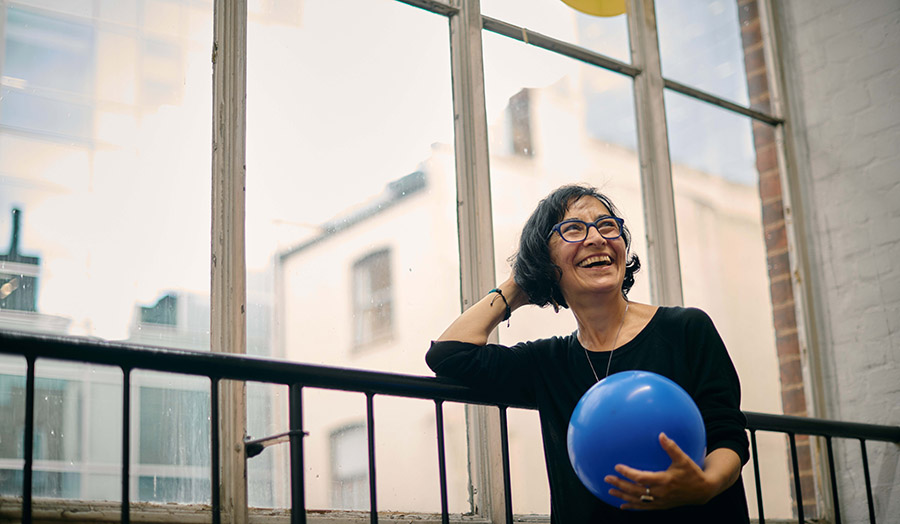Meet Mina Boromand - originally a political refugee, she arrived in London and began her journey at the School of Art, Architecture and Design. It was during her foundation year that Mina discovered her passion for photography which allowed her to deal with her anxiety. She's now an associate lecturer at London Met. Her research project was exhibited in Paris as part of the Carte Blanche Students Award in 2021, and published in breathing Space, a book of Iranian women photographers, by Editions Textuel in France and Thames & Hudson in English.
Tell us a little bit about yourself...
I was born in Tehran, Iran. Since childhood, I’ve had a fascination for photography and images. I had the opportunity to join the photography club during high school, which was supported by the company Fuji. That was my first time holding a camera.
What brought you to London Met?
When I arrived in London as a political refugee in 1991, I was introduced to taking an English course at the University of North London, as it was known at the time. I have pleasant memories of the very kind and dedicated teachers who guided me during my first steps into this new environment.
What did studying at London Met mean to you?
I was suffering from anxiety and panic attacks when I turned to a camera and photography; it became my healer. Shortly after that, I decided to study the foundation course in Art, Architecture, and Design (AAD) at London Met. It completely changed my life, and I’m very grateful for that. It marked a new beginning and a new direction for my journey. The caring, encouraging, and compassionate tutors, the freedom of playfulness, and the interesting classmates made it a beautiful experience for me.
Can you tell us about your current role, if you're working now?
I'm an associate lecturer in the Foundation course at London Met in the School of Art, Architecture and Design.
What is your biggest passion in life and where did that passion come from?
Humanity, nature, unity, and creativity (the process of creating). My passion comes from my culture, family, and life experiences. For instance, encountering the incredible power of unity during the 1979 revolution at a young age provided me with a strong sense of cooperation, sympathy, resistance, and resilience. My other passion is photography and art.
What drives you?
The wonderful energy and buzz I gain from it, the feeling of being connected to something powerful and natural, the kindness, and the love. One factor could be my neurodivergence, specifically aphantasia, which is the inability to imagine or visualise thoughts, which I discovered while studying at London Met and named my final project after it.
What’s the proudest moment in your life?
When I established a new life by studying at university with clear intentions and completed it, opening up great opportunities.
Can you tell us a bit about your interests outside of uni and why they are important to you?
Collaboration with other artists is a foundation for challenging myself, learning about different ideas, and creating something new. Participating in open calls challenges me to present my projects and discuss them in different ways, which isn’t natural for me since English isn’t my first language. Additionally, in a playful manner, I’m involved in caring for a child with learning differences. Another interest of mine is my well-being, which I nurture through breathing meditation and the cold shower technique.
Did you have any work experience as part of the course? Can you tell us more and what the challenges and highlights were?
I worked with a film crew to create a film for an autistic charity in London. I’ve always had a romantic idea of working in the film industry, but there is a lot of waiting time involved which can make the experience quite tedious. I also had a wonderful experience working on a participatory photography project with women in safe houses. During this process, I learned how workshops function and discovered my ability to connect with people easily.
What's next in your career?
I would like to settle into my academic position, exhibit more nationally and internationally, and become a speaker sharing my story.
Do you have any advice for anyone else considering studying at London Met?
If you’re looking for an institution that values different cultures, backgrounds, and diversity in general, London Met is the place to be. If you want to become part of a community, London Met is that community. If you have a desire to make a difference, to change your life, London Met will provide you with the tools, skills, and opportunities to do so. And if you’re seeking patient, collaborative tutoring and amazing facilities such as dark rooms, photography studios, and special collections, you are in the right place.
If you could sum up your experience at London Met in one word, what would it be?
Fantastic!

